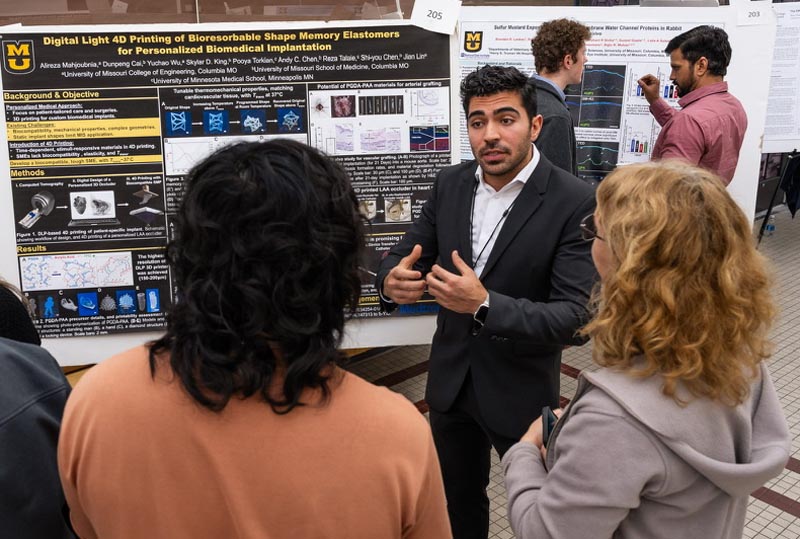February 20, 2024

A Mizzou Engineering research team has successfully developed a prototype for a personalized medical implant that promotes the regeneration of soft tissue.
The key is 4D printing, a 3D printing technique used on smart materials capable of changing function based on specific conditions.
“In dentistry and orthopedics, we already have personalized treatments,” said Alireza Mahjoubnia, a Ph.D. student in mechanical engineering. “They create a custom crown for your tooth and fit it onto an implant, or they design and manufacture a personalized prosthetic limb tailored to the patient’s specific needs. However, this level of personalization has not yet been achieved for soft tissue-related problems, and there’s a significant need to identify suitable materials that can address this gap.”
To address this gap, Mahjoubnia and collaborators used a special material called bioresorbable shape memory elastomer (SME) in a 4D printing process to create the complex structure with the ability to change shapes. They outlined the work in a paper published this month in the journal Acta Biomaterialia.
The team collaborated with interventional radiologists at the University of Minnesota (UMN) and physicians at Mizzou to test their process for cardiovascular applications.
“Doctors at the UMN radiology department wanted to design a personalized left atrial appendage occluder, so we designed and 4D printed it with our developed material,” Mahjoubnia said. “We designed an in vitro model of the patient and implanted it intravascularly inside a 3D printed heart of the patient to show a proof of concept of how the material would be used for that issue. That was a big step forward for this project.”
Doctors at the University of Missouri School of Medicine (SOM) have also tested the capability of the material via in vitro cell studies, and in vivo animal studies, which provided critical data as researchers ultimately hope to get FDA approval.
Last month, the university’s Technology Transfer Office filed a provisional patent for the technology.
“The main key is 4D printing,” Mahjoubnia said. “The material can change behavior based on physiological conditions. We program its shape to go through a catheter and after it gets inside the left atrial appendage, it can recover its shape to go back to its original shape, showing shape memory behavior. That’s how smart the material is.”
Another novelty of the material is that it acts as a scaffolding that can regenerate soft tissue. Unlike conventional methods—which use metallic coils that don’t match with soft tissue and can cause complications—the new material can be replaced by natural tissue over time.
“Conventional material is not smart and does not have regenerative properties, so this is going to help a lot of people in the future,” Mahjoubnia said. “These types of smart materials can be used for treating soft tissue problems, not only in the heart, but brain injuries, devices that can be used to monitor vital signs and more.”
The study was led by Jian Lin, an associate professor of mechanical and aerospace engineering. Other authors from MU include Dunpeng Cai (Co-first), Yuchao Wu, Skylar D. King, Shi-You Chen, a professor of surgery in the MU School of Medicine. Other authors Pooya Torkian and Reza Talaie are interventional radiologists from UMN. The work was funded by National Institute of Health under awards of 1R21EY034254-01A1 and 1R01HL147313.